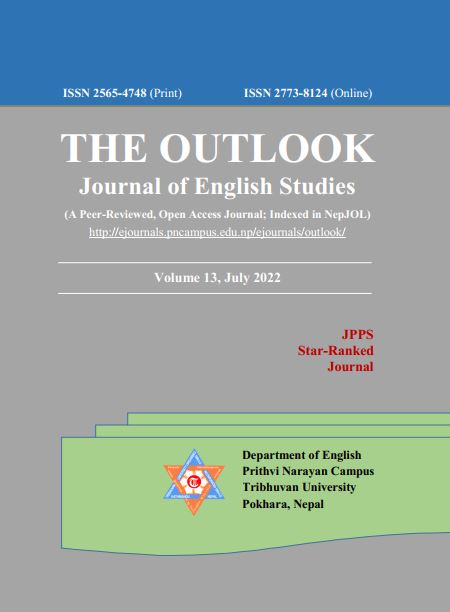Devkota’s Realization of Ultimate Reality: A Vedantic Reading on "Shūnyamā Shūnyasarī"
DOI:
https://doi.org/10.3126/ojes.v13i1.46693Keywords:
Brahman, Māyā, non-dual, Shrī Krishṇa, Vedanta, voidAbstract
This article analyzes Laxmi Prasad Devkota's Nepali poem "Shūnyamā Shūnyasarī" ("Being Empty in Emptiness") by using the insights of the Vedanta that has a special focus on non-dual (Advaita) philosophy. The poem is devotional as well as confessional, which is a common theme of South Asian literature composed in the Bhakti ("devotional”) tradition. Devkota, the last hour of his life, realized that he really went astray and could not follow his own tradition, culture, religion and spirituality properly. Although it was too late for him to correct his past mistakes, he accepted Lord Shrī Krishṇa as the essence of life; all the other things are Sūnya (“void, Māyā, illusion, nothing, or meaningless"). Sūnya means asat ("unreal"), which is not in existence really. Finally, the poet Devkota acknowledged that he vanished into void like a void being meaningless. He could not devote his life to seek Lord Shrī Krishṇa, who is the ultimate reality or essence of the universe. Devkota suggests that the goal of life should be to attain the ultimate reality for eternal liberation or perpetual peace and unbound joy. Life should be spent for this spiritual purpose. Life becomes meaningless if one dies without this kind of spiritual awareness.
Downloads
Downloads
Published
How to Cite
Issue
Section
License
Copyright (c) 2022 Damaru Chandra Bhatta

This work is licensed under a Creative Commons Attribution-NonCommercial 4.0 International License.
This license enables reusers to distribute, remix, adapt, and build upon the material in any medium or format for noncommercial purposes only, and only so long as attribution is given to the creator.

